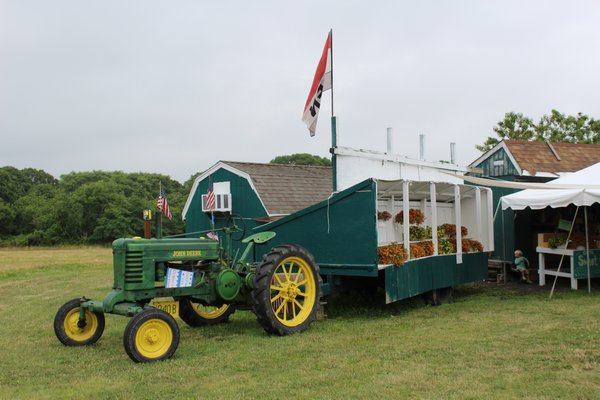
They started their egg business when their son, Ollie, was born. Now nearly 3, the towheaded toddler is a fixture at the Corwith Farm Stand off Head of Pond Road in Water Mill, running in the back fields or offering sunflowers to customers. “He pushed us to have something for ourselves to pass down,” said Audrey Diaz, 23, who operates the farm with her husband, Shaun Diaz, 25. “The future of farming is the next generation.”
For Ms. Diaz, whose maiden name is Corwith, this sense of stewardship is in her blood. Although her immediate family wasn’t involved with her grandfather and uncle’s potato farm, she grew up next to their land, with her parents telling her she was from a farm family. Ms. Diaz admits that she didn’t “know what that meant until I started my own.”
Committed to holistic management, an agriculture practice devised by Zimbabwean Allan Savory to reverse desertification caused by grazing, the pair is in their first year of business, thanks, in part, to their son. It was the initial success of their poultry business– aptly named Ollie’s Eggs– that led to their decision to start their own venture.
Even though the stand opened only a few weeks ago, there was an afternoon rush last Thursday as passersby dropped in to pick up ingredients for a berry crisp or sweet corn for that night's dinner.
“I was heading over to a different farm stand and did a U-ie,” said Lisa Bass. Ms. Bass, who lives nearby, said she was tempted to stop thanks to the bright signs as well as a recommendation from her tenants.
The couple feels they are part of a growing community of young agrarians on the East End who are turning toward alternative growing methods. Mr. Diaz, who spent most of his career thus far working on other farms, said he is committed to learning principles like soil management from fellow farms like the Green Thumb, Open Minded Organics and the Milk Pail.
Using Facebook and Instagram, Ms. Diaz shares updates about daily life on the farm, hoping to attract business and educate consumers.
“We have such a history here with farming but I don’t think people understand what goes into it,” Mr. Diaz said, adding that he hopes they can begin educational outreach with children and adults in the area.
As with any small business in its first few years, Corwith Farm Stand is a seemingly never-ending project. During the summer, the couple has help in the fields while they mind their stand Thursday through Sunday. However, Ms. Diaz said, “it doesn't feel like work.”
When out in the fields, the Diazes are focused on “reconditioning the soil,” as Ms. Diaz calls it. Admitting that organic farming is more difficult than other methods, she explained that they are working to build nutrients in the loam so that their plants can fight off pests and disease.
Operating on 10 acres now, they hope to be able to add more land in the future. For now, they have just enough space for their chickens, vegetables and newly-planted berry bushes. However, their dream– to begin raising livestock for meat– would require additional acreage for grazing.
Their biggest obstacle for raising livestock is finding a place to process the animal. Because there is a lack of processing facilities, farmers on Long Island currently are forced to ship their animals to upstate New York or New England.
Robert Carpenter, administrative director of the Long Island Farm Bureau, called that “a major concern for all livestock producers on the East End.”The hardship is especially felt on the North Fork, where there are more farmers who raise animals for consumption.
As restaurateurs on the East End are becoming more interested in the slow food movement, Mr. Carpenter said, he believes there could be a sizable market for locally-sourced meat. Livestock offers a high profit per acre, so that business could be a boon for farmers, if there were closer facilities.
County Legislator Al Krupski is leading a campaign to create a commercially accessible animal processing center out of a former facility in Yaphank. It was operated by the Cornell Cooperative Extension as a butcher-training facility for prisoners in Yaphank and Riverhead jails, and while under Cornell Cooperative Extension was not available to commercial farmers.
“Locally sourced food is the safest and most nutritious,” Mr. Krupski said this week. With the addition of a meat processing center, he said, he believes smaller farmers will be more able to diversify and raise livestock.
But the Diaz family isn’t letting the lack of facilities get in way of their dreams. This year they will acquire their first cow, a Scottish Highlander from the nearby Green Thumb. They hope that the distinguished species, known for its shaggy long hair, will be the first of a herd.
Although they feel well supported by local family and friends, they admit that there are unique pressures to growing food on the South Fork. “You drive by land and see houses going up, Ms. Diaz said of former farm fields. "It is hard to feel supported by that.”
"